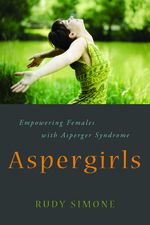
Asperger syndrome (AS), also known as Asperger's syndrome or Asperger's, is a term formerly used to describe a neurodevelopmental condition characterized by significant difficulties in social interaction and nonverbal communication, along with restricted, repetitive patterns of behavior and interests. Asperger syndrome has been merged with other conditions into autism spectrum disorder (ASD) and is no longer considered a diagnosis. It was considered milder than other diagnoses which were merged into ASD due to relatively unimpaired spoken language and intelligence.
The diagnostic category pervasive developmental disorders (PDD), as opposed to specific developmental disorders (SDD), was a group of disorders characterized by delays in the development of multiple basic functions including socialization and communication. It was defined by the Diagnostic and Statistical Manual of Mental Disorders (DSM), and the International Classification of Diseases (ICD).
Pervasive developmental disorder not otherwise specified (PDD-NOS) is a historic psychiatric diagnosis first defined in 1980 that has since been incorporated into autism spectrum disorder in the DSM-5 (2013).

Anthony John Attwood is a British psychologist notable for his work on Asperger syndrome. He resides in Queensland, Australia, where he is an Associate Professor at Griffith University.
Nonverbal learning disorder is a proposed category of neurodevelopmental disorder characterized by core deficits in non-verbal skills, especially visual-spatial processing. People with this condition have normal or advanced verbal intelligence and significantly lower nonverbal intelligence. A review of papers found that proposed diagnostic criteria were inconsistent. Proposed additional diagnostic criteria include intact verbal intelligence, and deficits in the following: visuoconstruction abilities, speech prosody, fine motor coordination, mathematical reasoning, visuospatial memory and social skills. NVLD is not recognised by the DSM-5 and is not clinically distinct from learning disorders.
Dr Jacqueline Carol Jackson is a British writer who consults, counsels, speaks and writes on most autism issues. Her doctoral thesis, entitled 'Nurturing the Engagement of Children with an Autism Spectrum Disorder through Digital Polysensory Experiences', awarded from Coventry University, analysed the sensory differences of children with an ASD and the impact of the digital and built environment. Jackson consultants on the design of built environments and the impact of lighting and design on individuals with autism spectrum disorder and other neurodiversities.

Self-stimulatory behavior, also known as "stimming" and self-stimulation, is the repetition of physical movements, sounds, words, moving objects, or other behaviors. Such behaviors are found to some degree in all people, especially those with developmental disabilities such as ADHD, as well as autistic people. People diagnosed with sensory processing disorder are also known to potentially exhibit stimming behaviors.
The autism-spectrum quotient (AQ) is a questionnaire published in 2001 by Simon Baron-Cohen and his colleagues at the Autism Research Centre in Cambridge, UK. Consisting of fifty questions, it aims to investigate whether adults of average intelligence have symptoms of autism spectrum conditions. More recently, versions of the AQ for children and adolescents have also been published.
Jessica Kingsley Publishers (JKP) is a multinational publishing house headquartered in London. It was founded as an independent publisher in 1987 by Jessica Kingsley. Since 2017, JKP operates as an imprint of John Murray Press.

Like Colour To The Blind (1996) is the third in a series of four autobiographical works by internationally bestselling autistic author Donna Williams.

Societal and cultural aspects of autism or sociology of autism come into play with recognition of autism, approaches to its support services and therapies, and how autism affects the definition of personhood. The autistic community is divided primarily into two camps; the autism rights movement and the pathology paradigm. The pathology paradigm advocates for supporting research into therapies, treatments, and/or a cure to help minimize or remove autistic traits, seeing treatment as vital to help individuals with autism, while the neurodiversity movement believes autism should be seen as a different way of being and advocates against a cure and interventions that focus on normalization, seeing it as trying to exterminate autistic people and their individuality. Both are controversial in autism communities and advocacy which has led to significant infighting between these two camps. While the dominant paradigm is the pathology paradigm and is followed largely by autism research and scientific communities, the neurodiversity movement is highly popular among most autistic people, within autism advocacy, autism rights organizations, and related neurodiversity approaches have been rapidly growing and applied in the autism research field in the last few years.
Asperger syndrome (AS) was formerly a separate diagnosis under autism spectrum disorder. Under the DSM-5 and ICD-11, patients formerly diagnosable with Asperger syndrome are diagnosable with Autism Spectrum Disorder. The term is considered offensive by some autistic individuals. It was named after Hans Asperger (1906–80), who was an Austrian psychiatrist and pediatrician. An English psychiatrist, Lorna Wing, popularized the term "Asperger's syndrome" in a 1981 publication; the first book in English on Asperger syndrome was written by Uta Frith in 1991 and the condition was subsequently recognized in formal diagnostic manuals later in the 1990s.

Michael Fitzgerald is an Irish professor of child and adolescent psychiatry, specialising in autism spectrum disorder (ASD).
Autism spectrum disorders (ASDs) or autism spectrum conditions (ASCs) describe a range of conditions classified as neurodevelopmental disorders in the DSM-5, used by the American Psychiatric Association. As with many neurodivergent people and conditions, the popular image of autistic people and autism itself is often based on inaccurate media representations. Additionally, media about autism may promote pseudoscience such as vaccine denial or facilitated communication.

Rudy Simone is an American author of books on Asperger's Syndrome.
Gunilla Gerland is a Swedish author and lecturer on the topic of autism. Her written works include Secrets to Success for Professionals in the Autism Field: An Insider's Guide to Understanding the Autism Spectrum, the Environment and Your Role and her autobiography A Real Person: Life on the Outside.

Jennifer Cook (formerly O'Toole) (born October 24, 1975) is an American author and speaker. She is known for her six Asperkids books, which have been translated into six languages and include the winner of the Autism Society of America's Book of the Year Award. Her memoir Autism in Heels: The Untold Story of a Female Life on the Spectrum is a Wall Street Journal Bestseller, a "Best Book" title winner by Publishers Weekly, and named a "Best Memoir" and one of both the "Best Autism Books of All Time" and "Best-Selling Autism Books of All Time" by BookAuthority. She is the on-camera autism expert in Netflix's series Love on the Spectrum.
Sex and gender differences in autism exist regarding prevalence, presentation, and diagnosis.
Liane Holliday Willey is an American writer, researcher and advocate for people with Asperger's Syndrome. She has written several books on Asperger's Syndrome, including "Pretending to be Normal: Living with Asperger's Syndrome" and "Asperger Syndrome in the Family: Redefining Normal."
Pretending to Be Normal: Living with Asperger's Syndrome is a book written by Liane Holliday Willey, published by Jessica Kingsley Publishers, that offers insight into the experience of living with Asperger's syndrome, a neurodevelopmental disorder characterized by difficulties with social interaction and communication, as well as repetitive behaviors and interests. The book was first published in 1999 and has since been updated, in 2014, with an additional 15 years of reflection by the author on living with Asperger's syndrome.








